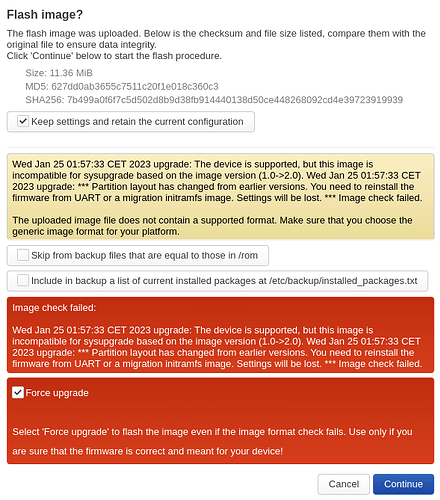Ah. This means that @joba-1 log will not help here either then. ![]()
So let me repeat, please
And what to do once this is booted? Normal sysupgrade?
The one I didn't had UART, I did tftp recovery to xiaomi factory FW.
After that you can follow the wiki to install the latest snapshot from openwrt repo.
The other one that I had UART, I booted a initramfs image and sysupgrade from there.
thank you. I hoped I can use one of the openwrt initram images (like with uart) and not deal with "reading" chinese again. https://openwrt.org/toh/xiaomi/ax3600 also describes using the chinese fw, so be it...
yeah, tfttp recovery only loads xiaomi FW.
I also hate that xiaomi FW, you saw I posted some translated screenshots. ![]()
https://forum.openwrt.org/t/adding-openwrt-support-for-xiaomi-ax3600-part-1/55049/9836
Why not use Global 3.0.22 firmware for tftp recovery?
As far as we know, only the Chinese OEM firmware version 1.0.17 allows the exploit that allows to enable SSH.
Global 3.0.22 allows it?
maybe I'll fall back to opening the device and use uart anyways: dnsmasq bothers me with /tmp/tftp inaccessible: Permission denied (although root has permission)
Didn't knew that method had evolved and was in the wiki.
With UART you'll also need tftp to load initramfs.
I am trying to update my ax3600 equipment.
I have downloaded the latest version from here:
https://downloads.openwrt.org/snapshots/targets/ipq807x/generic/
when I proceed to upgrade via lede I get this error. I am not clear how I should proceed, any help?
and how could I do to preserve all the configurations?
Thanks!
damn. Looks like opensuse made tftp secure by making it impossible to use it at all ![]()
Without the --tftp-root option it starts (and says TFTP enabled) but still nothing happening when bootp messages come in. (no reaction seen by tcpdump)
I'll continue another day. Thanks so far!
Yes, I have enabled both for better throughput and did restart after changing packet steering.
This clearly seems to be very specific to Macbook Pro. Hopefully someone else can repro it and triage it
I followed these guidelines and it worked here.
I did tftp recovery in win, so don't know what's that issue, but did you remember to disable the firewall service?
I have the following script running every few minutes to check for those errors and reboot. It also sends me a notification via Telegram.
# Reboot on ath11k errors
result=$(logread -l 500 | grep "ath11k c000000.wifi: failed to send WMI_PDEV_BSS_CHAN_INFO_REQUEST cmd" | wc -l)
if [ "$result" -ne 0 ]; then
(
echo "{\"chat_id\": \"CHATIDHERE\", \"text\":\""
echo "AX3600 rebooted due to an ath11k crash"
echo "\", \"disable_notification\": true}"
) | curl -X POST \
-H 'Content-Type: application/json' \
--data-binary @- \
https://api.telegram.org/botAPIKEYHERE/sendMessage && \
reboot;
fi
BTW, I was having A LOT of these issues back in December and decided to try applying bitthief's NSS patches and I am no longer getting these errors. I don't know how/why NSS patches resolved this if no WiFi acceleration is implemented but I haven't experienced any issue in a month of uptime.
Verify that UDP port 69 is open.
You may need to add the tftp service in firewall:
sudo firewall-cmd --add-service=tftp --permanent
sudo firewall-cmd --reload
Thanks for the firewall hints.
I switched it completely off (iptables lists nothing). I also switched off apparmor (that can prevent file access, etc). Its just the notebook and the router and the lan cable between them. Difficult to hack an air gap...
I may try the windows route next. That would be a first for decades - usually it is the other way round: I solve my windows problems on linux ![]()
Don't downgrade ![]()
